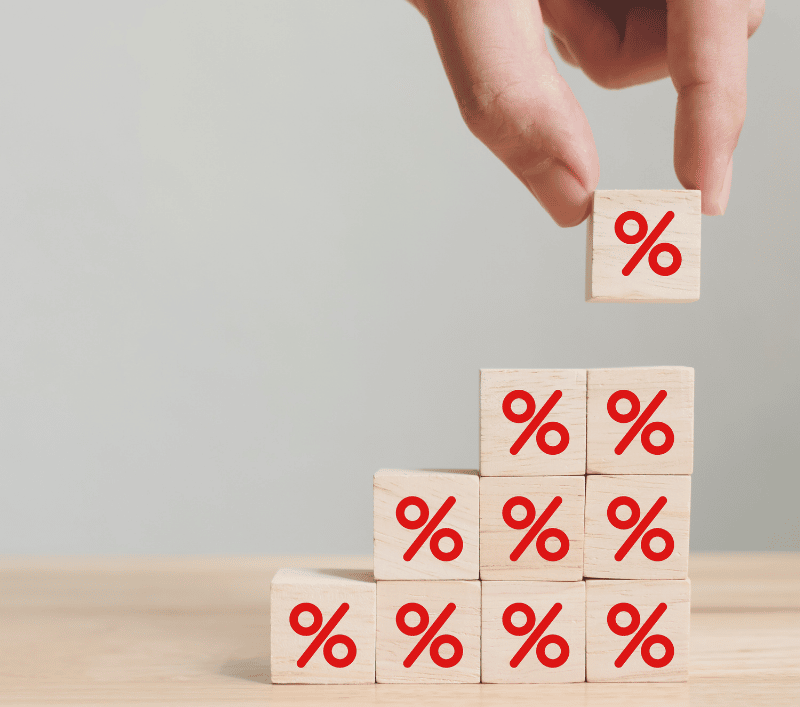
After a few years of decreasing mortgage interest rates, homebuyers face increased rates for the first time. What can cause the increasing mortgage interest rates, and what can we expect in the future?
Increasing mortgage interest rates go together with inflation. When inflation rises, interest rates usually rise in tandem to keep up with the currency's value.
After the Russian invasion of Ukraine, inflation slowly started to take over the countries in Europe. The eurozone inflation rate approached 8.1% in March, succeeding the European Central Bank (ECB) expectations.
The main reason behind the increasing inflation is the elevation of energy prices. According to the ABN AMRO bank, the household energy prices rose to 40% from 20%, and car fuel to 50% from 25%.
EU monetary policy
The ECB's monetary policy has a significant influence on mortgage interest rates. In July 2022, the European Central Bank will raise rates by a quarter of a percentage. Another rate increase is expected in September, possibly by half a percent. There will be a couple more interest rate hikes in the months ahead.
Economic factors
Mortgage rates are influenced by economic growth indicators such as the gross domestic product and the unemployment rate. Higher incomes and spending are associated with economic growth, which benefits the financial situation and increases mortgage demand. In this case, mortgage lenders can raise interest rates to control the market. When financial performance slows down, the reverse happens, and there is more pressure for lenders to reduce mortgage interest rates.
Housing market conditions
Housing market trends and conditions can also influence mortgage rates. When fewer homes are built or offered for sale, there is less demand for mortgages, which causes fluctuating mortgage interest rates.
Your personal situation
Your loan term, down payment, payback period, and personal financial situation can influence your mortgage interest rate. For example, the length of your rate term also affects your rate. Loans with shorter rate terms have lower interest rates than those with longer rate terms.
Interest rates in the Netherlands
Since October of 2021, mortgage interest rates have increased in the Netherlands. One of the most prominent Dutch banks (ABN AMRO Bank) states that interest rates will continue to climb because of rising energy prices, the war in Ukraine, continuous production chain disruption, and post-Covid-19 recovery.
The ECB also expects inflation to rise due to Russia's invasion of Ukraine. This is also one of the reasons that risk premiums in financial markets have soared due to the threat of increasing conflict. As a result, mortgage lenders must incur higher costs when raising financing for their mortgages, and they will not be able to pass on all of these costs due to the fierce competition in the mortgage industry.


Dutch housing market
Dutch housing prices rose by 15.2% in 2021, whereas banks expect an increase between 12.5% (ABN Amro) and 13.5% (ING) on average in 2022.
The Dutch government aims to aid housing affordability by realizing more building projects in the future. The post-pandemic house shortages made the market more competitive due to a lack of construction and a higher demand for homeownership during the pandemic. It is not predicted prices to drop in the future. It is important to note that the actual interest rates are negative, which is a positive prerequisite for buying a house and investing this way.
Buying remains the preference compared to renting, even more so considering that the rent prices are also to be influenced by inflation.
What options do I have?
As previously said, current mortgage interest rates are still low compared to prior years. Considering how long you want to lock in your interest rate if you're considering getting a mortgage right now. Looking ahead, there is always the possibility of refinancing your mortgage. Schedule a call below or read our article Why increasing mortgage interest rates shouldn't scare you.
Schedule a complimentary introductory call with our mortgage specialists. We specialize in mortgages for expats and are dedicated to navigating you through the home-buying process.
-
Get clarity on your financial possibilities.
-
Access to a trusted network.
-
Highly competitive rates and flexible terms.
-
English translations of bank documents are shared.

- 100% Independent Advice




